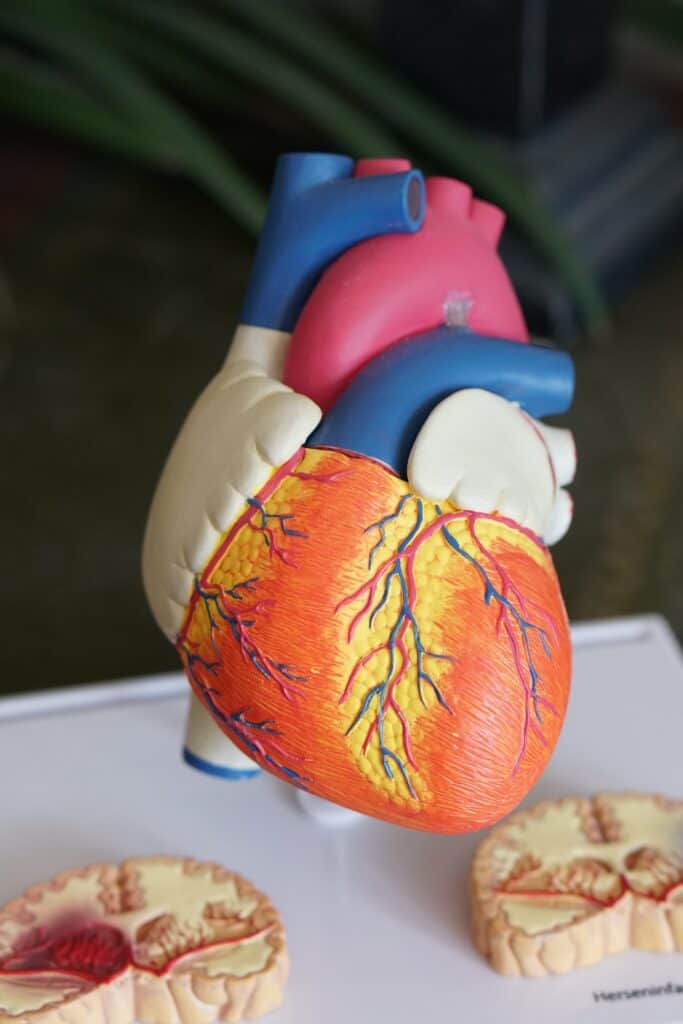Heart disease describes a range of conditions that affect your heart. One out of every four deaths in the United States is a result of heart disease (1). You can lower the risks associated with heart disease and related health conditions by being pro-active about your health.
What is Heart Disease?
The term heart disease is used interchangeably with the term cardiovascular disease (CVD). “CVD generally refers to conditions that involve narrow or blocked blood vessels that can lead to a heart attack or stroke.” Some of the most common diseases of the heart include atherosclerosis, heart attacks, heart failure, heart valve problems, and arrhythmias.” (2)
These diseases are just some of the most common diseases of the heart. There also are heart diseases caused by congenital heart defects, having a weak heart muscle, a weak heart valve, as well as infections.
What Causes Heart Diseases?
A sedentary lifestyle is one of the 5 major risk factors for CVD, along with high blood pressure, abnormal blood lipid values, smoking, and obesity, as outlined by the AHA. (3)
Other chronic health problems that can lead to heart disease include: type II diabetes, osteoporosis, and some forms of cancer. (4)
Additionally, some people are more genetically predisposed to these kinds of diseases. For congenital ailments, improper prenatal care could also cause heart disease among infants.
How can Heart Disease be prevented?
Making healthy diet and lifestyle choices can reduce your risk of heart disease, conditions that lead to heart disease, and other chronic health problems. (4)
Quit smoking! Nicotine constricts your blood vessels and carbon monoxide damages the lining of your blood vessels, both of these can lead to atherosclerosis. (5)
Keep diabetes under control. If you have diabetes, steady blood sugar control can help reduce the risk of heart disease. (5)
Dietary changes that can reduce the risk of heart disease involve adding raw whole foods and cutting out processed foods. Meals should be centered around organic whole foods including: vegetables, fruits, grass-fed proteins, olive oils, nuts, seeds, and healthy fats. Fish, including salmon and tuna, contain high amounts of omega 3’s, which is a great option for people trying to lose weight. (4)
Signs and Symptoms
The symptoms of heart disease vary depending on the specific condition and gender. Symptoms of heart disease can include chest pain, pain, weakness, numbness, and coldness in the arm or legs, pain in the neck, back, and abdominal areas, as well as shortness of breath despite not exerting oneself physically.
How is it Treated?
Given that heart disease is a collective term, treatment would vary depending on the type and nature of the disease. For diseases like heart attack and stroke, treatment should be given as soon as possible to prevent the condition from worsening and even death.
Getting Treatment the Natural Way
Supplementing with Omega-3 Fatty Acids and Coenzyme Q-10, which are known to help ease out free radicals and lower levels of bad cholesterol in the body, are great ways to reduce your risk of heart disease. (5 )
Certain types of heart disease can’t be prevented, like congenital forms. But, you can help prevent many other types of heart disease and the related conditions by making lifestyle changes, for example, the ones recommended by Mayo Clinic: (6)
- Quit smoking
- Control other health conditions, such as high blood pressure, high cholesterol and diabetes
- Exercise at least 30 minutes a day 3-5 days of the week
- Eat a diet that’s low in sodium, sugar, and trans fat
- Maintain a healthy weight
- Reduce and manage stress
- Practice good hygiene
For more information about what you can do to prevent heart disease and start to reach your health goals, call 844-789-8446 or schedule a free consultation today!
Medically reviewed and written by:
Dr. Jason Olafsson
Resources:
- https://www.cdc.gov/heartdisease/facts.htm
- https://www.mayoclinic.org/diseases-conditions/heart-disease/basics/definition/con-20034056)
- https://circ.ahajournals.org/content/107/1/e2
- https://medlineplus.gov/ency/article/002436.htm
- https://www.ncbi.nlm.nih.gov/pmc/articles/PMC3494243/
- https://www.mayoclinic.org/diseases-conditions/heart-disease/basics/risk-factors/con-20034056







